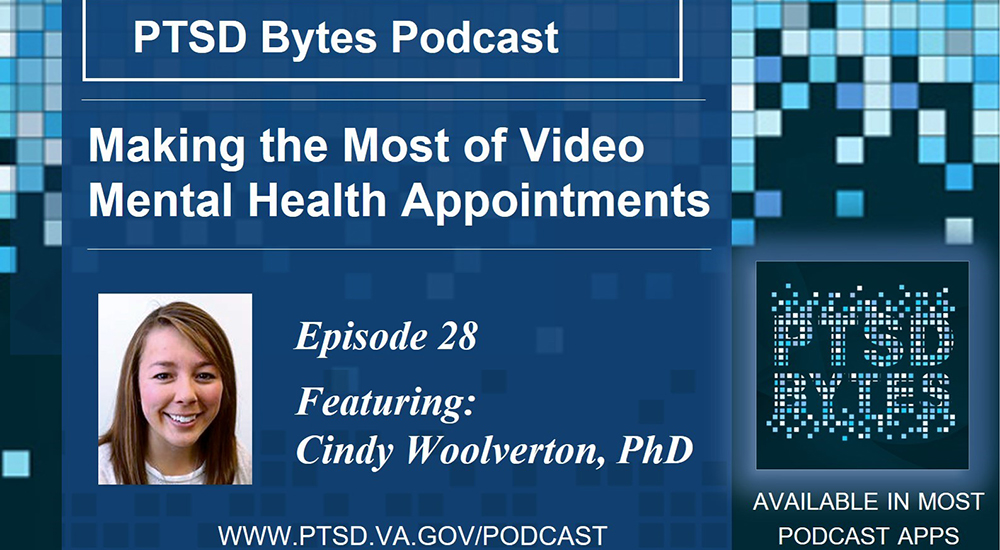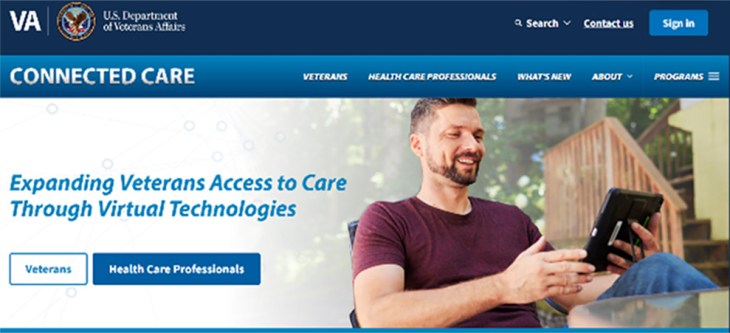Advantages of video mental health appointments
The number of health care visits taking place over video increased dramatically during the COVID-19 pandemic and many people are still choosing video for their mental health appointments. Video visits can be more convenient than meeting in person because you may not need to leave home or travel to receive care. This can be especially helpful if you have a busy schedule or live far from the nearest clinic.
Video allows you and your provider to see each other’s reactions and body language as though you were meeting face-to-face. Research has shown that video mental health visits offer the same benefits as in-person care.
Finding mental health care
If you receive health care through VA, your primary care provider can help you get connected to a mental health team. You can also find local mental health services for Veterans by searching online. Outside of VA, you can search other directories for mental health care in your area, such as the Substance Abuse and Mental Health Service Administration treatment locator.
There are a range of choices available for mental health appointments, including in-person, video or a combination of the two. Your provider can help you explore these options and together you can decide which works best for you.
Support available for video technology
If you’re feeling uncertain about using video technology, there are many resources available to help you get started. If you are receiving VA care and don’t have a device you can use for video appointments, VA can loan you a tablet to use. The VA Office of Connected Care can also guide you through the steps to prepare for your appointment and help you troubleshoot any technology issues. Their help desk is available 24/7 at 866-651-3180. Many VA facilities now have virtual health resource centers, which are staffed by health technology experts who can provide hands-on support and troubleshooting. Ask your local provider or clinic staff if they have additional resources to help you get comfortable using video.
Getting ready for your video appointment
To join your video appointment, you will need a tablet, a smartphone or a computer with a camera and microphone. Using headphones can help make your appointment more private. It’s a good idea to test out your webcam, microphone and audio in advance. You might be able do a test call if you are using a program such as VA Video Connect. When it’s time for your first appointment, you can also have a family member help you make sure everything is working.
Additional links:
- Learn more about telehealth services at VA
- PTSD Bytes episodes
If you are a Veteran experiencing a crisis or supporting a loved one who is, call 988 and press 1 for immediate assistance, or chat online at VeteransCrisisLine.net/chat.
Topics in this story
Link Disclaimer
This page includes links to other websites outside our control and jurisdiction. VA is not responsible for the privacy practices or the content of non-VA Web sites. We encourage you to review the privacy policy or terms and conditions of those sites to fully understand what information is collected and how it is used.
More Stories
Study underscores important role COVID vaccination can have in protecting Veterans from infection and reducing long-term health consequences
Columbia VA’s robotic surgery teams completed their 800th robotic surgery and are on schedule to hit 1,000 by the end of the year.
In a decentralized clinical trial, Veterans can participate from their own homes or local VA instead of having to travel to a research site.








I don’t know whether video appointments benefit the VA or the vets the most, but, I do know from experience that I have received excellent assistance via the VA video appointments.
It may be that I favor video appointments because I live 35-40 minutes from the VA hospital and the commute traffic is more demanding and physically risky than ever.
So long as the VA is able to provide each vet a choice of in-person or video appointments, I will applaud the VA for providing a choice.
I don’t agree at all that it provides the same connection and benefit. I think it benefits the VA and benefits the staff and the doctors more than it benefits the patients. My concern is that this evidence will be used to limit and force telehealth treatment. For many of us our appointments are the only human contact we have, period. I haven’t had a conversation with a human that wasn’t a VA doctor in months. I also know that I am confronted more as I cannot hide things from my doctors in person but I can lie and avoid and not get called on any of it over video. I can just get it over with, which is what the doctors seem to want too. In person visits are ALWAYS longer. Video for me averages in single digit minutes. This is dangerous. In no way does it offer the same benefits. A hand shake, real eye contact, sitting in a chair across from someone, that really matters and you may say it will always be an option but I’m routinely told I can’t see someone in person. This change benefits the VA, not the Veteran and until I see some real protections I just can’t believe otherwise.
Thank you for sharing your experience. And you’re certainly not alone – many people still prefer in-person appointments because of the reasons you mentioned. VA tries to offer both virtual and in-person appointments as much as possible, so the Veteran can choose what works best for them. However, depending on your location, some services may not be available locally. I’m sorry to hear that you’d prefer to see someone in person and have been routinely told that you can’t. Providing Veterans with the best care and customer service is a VA priority. If you’d like to change how you’re receiving VA care, you can see if your local VA’s patient advocate can help (www.va.gov/health/patientadvocate). You can get in touch with them by calling your local VA Medical Center and asking for a patient advocate. You can also search online using your local VA name and “patient advocate” – the top result should be a website with that person’s name and contact information. We hope this information helps.